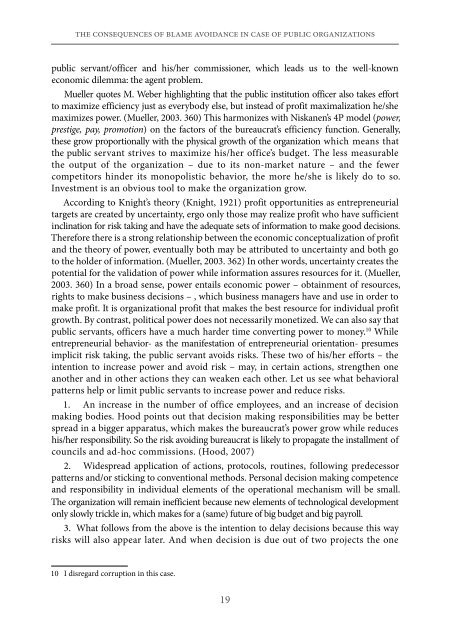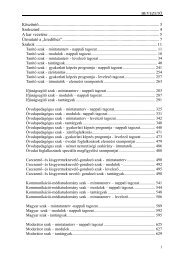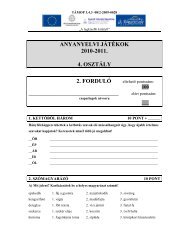ACTA SZEKSZARDIENSIUM - Pécsi Tudományegyetem Illyés Gyula ...
ACTA SZEKSZARDIENSIUM - Pécsi Tudományegyetem Illyés Gyula ...
ACTA SZEKSZARDIENSIUM - Pécsi Tudományegyetem Illyés Gyula ...
You also want an ePaper? Increase the reach of your titles
YUMPU automatically turns print PDFs into web optimized ePapers that Google loves.
the consequences of blame avoidance in case of public organizations<br />
public servant/officer and his/her commissioner, which leads us to the well-known<br />
economic dilemma: the agent problem.<br />
Mueller quotes M. Weber highlighting that the public institution officer also takes effort<br />
to maximize efficiency just as everybody else, but instead of profit maximalization he/she<br />
maximizes power. (Mueller, 2003. 360) This harmonizes with Niskanen’s 4P model (power,<br />
prestige, pay, promotion) on the factors of the bureaucrat’s efficiency function. Generally,<br />
these grow proportionally with the physical growth of the organization which means that<br />
the public servant strives to maximize his/her office’s budget. The less measurable<br />
the output of the organization – due to its non-market nature – and the fewer<br />
competitors hinder its monopolistic behavior, the more he/she is likely do to so.<br />
Investment is an obvious tool to make the organization grow.<br />
According to Knight’s theory (Knight, 1921) profit opportunities as entrepreneurial<br />
targets are created by uncertainty, ergo only those may realize profit who have sufficient<br />
inclination for risk taking and have the adequate sets of information to make good decisions.<br />
Therefore there is a strong relationship between the economic conceptualization of profit<br />
and the theory of power, eventually both may be attributed to uncertainty and both go<br />
to the holder of information. (Mueller, 2003. 362) In other words, uncertainty creates the<br />
potential for the validation of power while information assures resources for it. (Mueller,<br />
2003. 360) In a broad sense, power entails economic power – obtainment of resources,<br />
rights to make business decisions – , which business managers have and use in order to<br />
make profit. It is organizational profit that makes the best resource for individual profit<br />
growth. By contrast, political power does not necessarily monetized. We can also say that<br />
public servants, officers have a much harder time converting power to money. 10 While<br />
entrepreneurial behavior- as the manifestation of entrepreneurial orientation- presumes<br />
implicit risk taking, the public servant avoids risks. These two of his/her efforts – the<br />
intention to increase power and avoid risk – may, in certain actions, strengthen one<br />
another and in other actions they can weaken each other. Let us see what behavioral<br />
patterns help or limit public servants to increase power and reduce risks.<br />
1. An increase in the number of office employees, and an increase of decision<br />
making bodies. Hood points out that decision making responsibilities may be better<br />
spread in a bigger apparatus, which makes the bureaucrat’s power grow while reduces<br />
his/her responsibility. So the risk avoiding bureaucrat is likely to propagate the installment of<br />
councils and ad-hoc commissions. (Hood, 2007)<br />
2. Widespread application of actions, protocols, routines, following predecessor<br />
patterns and/or sticking to conventional methods. Personal decision making competence<br />
and responsibility in individual elements of the operational mechanism will be small.<br />
The organization will remain inefficient because new elements of technological development<br />
only slowly trickle in, which makes for a (same) future of big budget and big payroll.<br />
3. What follows from the above is the intention to delay decisions because this way<br />
risks will also appear later. And when decision is due out of two projects the one<br />
10 I disregard corruption in this case.<br />
19




